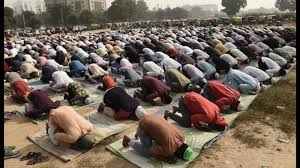
30-Sep-2024 , Updated on 9/30/2024 10:26:41 PM
If Namaz is banned in Abu Dhabi, why is it difficult to enforce a ban on public Namaz in India?
Offering namaz, the Islamic prayer, in public spaces and how these regulations will be implemented in various countries are touchy subjects. This is something that needs to be tackled in its entirety. Although law within Abu Dhabi conforms to Islamic law, it also strictly controls and regulates behaviour, religious activity, and public access to spaces within Abu Dhabi, as the capital of the UAE. Despite the integration of law in Abu Dhabi with Islamic law, the law in Abu Dhabi regulates and controls behaviour strongly and religious activity in addition to access to the public spaces in Abu Dhabi which is the capital city of the UAE. Even in the UAE which has Islam as its official religion, praying in some of these areas may not be allowed at some time because the authorities want to maintain law and order, and ensure the safety of the residents as well as control the usage of the public space. However, Namaz's performance in public areas has always been a matter of controversy and debate in some parts of India.

Sometimes, Muslims offer namaz in the open ground, parks or streets where there are no mosquitoes or, where there is overcrowding mostly during Friday prayer or festivals such as Eid. In most cases, these assemblies are more of a parade though they have sometimes occurred amid some resistance from some people or some authorities. India is a country with people from Hinduism, Muslims, Christians, Sikhs, Buddhists, Jains and other religions of the world. Religious gatherings are a part of the daily life of the people of India regardless of whether, it is the Hindu religious processions and rites, infectious Christian festivals, prayer meetings of Muslims or festivals of Sikhs. Indeed, state prohibition of praying in public places is unworkable given the religions available; anyone who attempts it will appear to be restricting only some houses of worship while ignoring others. The controversy involving public namaz in India contains a recap of the difficult issues of religious diversity regulation in India. The rules that the UAE has adopted over the years concerning public prayer fundamentally border on the culture and politics of the place, therefore, applying the regulations in India is far from being easy. Because of the secular constitution of India and constitutional provision of freedom of religion, any restriction on religious practice, including public namaz, has to necessarily respect civil liberties as well as public order.
Though occasions for public namaz have been traditionally observed in many parts of India, it has emerged as a contentious issue in those sections of the country where demographic and political change is underway. According to the respondents, some of the places users of spaces held mixed populations, some opposed public namaz because it interferes with everyday activities or they think that it is a gimmick used to occupy public domains. In some locations, it is thought that public prayers mean religiosity that leads to division, especially in politically charged areas. Again during the pray times people flock to the urban areas to pray which leads to anti-social behaviour such as traffic jams and overcrowded use of facilities. Of all these interesting, some are sometimes exercised under the pretext of law and order or disguised prejudice against religion. Instead of perceiving this problem as a conflict issue, it is important to encourage communication between communities, local administration and clergy. Some of the possible recommendations could include change of layout of city and public areas to fit people of the Islamic faith and others with equal provisions for prayers and respect for one's faith by other religions. Thus, India can preserve its secularism while acting in response to requests connected with public worship.

Student
hey there! i am a student currently pursuing my bachelors with a keen interest in writing., I am fueled by a deep love for storytelling and a flair for creating captivating narratives. Armed with a passion for language and a keen eye for detail, I strive to craft compelling copy that leaves a lasting impact.
Join Our Newsletter
Subscribe to our newsletter to receive emails about new views posts, releases and updates.
Copyright 2010 - 2026 MindStick Software Pvt. Ltd. All Rights Reserved Privacy Policy | Terms & Conditions | Cookie Policy